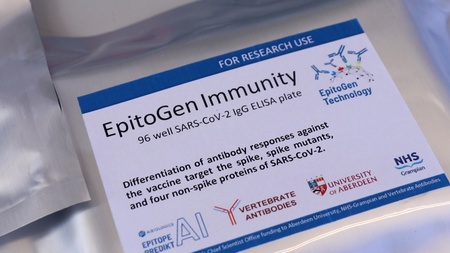Antibody tests that can detect whether people have been exposed to new variants of Covid-19 have been developed by the University of Aberdeen, in collaboration with biotechnology group Vertebrate Antibodies Ltd and NHS Grampian.
The new tests can detect antibody responses to infection by SARS-CoV-2 virus with more than 98% accuracy and 100% specificity. This is in contrast to currently available tests that are around 60-93% accurate and cannot differentiate unique variants.
For the first time, the new tests can be used to estimate the prevalence of circulating variant strains in the community, including the variants first identified in Kent and in India, now known as the Alpha and Delta variants. The tests can also assess the long-term immunity of an individual and whether immunity is vaccine-induced or is a result of previous exposure to the infection – information that is invaluable in helping to prevent the spread of infection.
In addition to this, the tests can also provide information that can be used to estimate the duration of the immunity provided by the vaccine as well as the effectiveness of the vaccine on emerging variants.
This is an improvement on the currently available tests that struggle to detect variants and give little or no information on the impact of virus mutations on vaccine performance.
Professor Mirela Delibegovic from the University of Aberdeen and academic lead on the project explains: “Accurate antibody tests will become increasingly important in the management of the pandemic and this is a truly game-changing technology with the potential to dramatically change the trajectory of global recovery from the pandemic.”
Professor Delibegovic worked alongside industry partners, Vertebrate Antibodies and colleagues in NHS Grampian to develop the new tests using the innovative antibody technology known as Epitogen.
Funded by the Scottish Government Chief Scientist Office Rapid Response in COVID-19 (RARC-19) research programme, the team used artificial intelligence called EpitopePredikt, to identify specific elements, or ‘hot spots’ of the virus that trigger the body’s immune defence. The researchers were then able to develop a new way to display these viral elements as they would appear naturally in the virus, using a biological platform they named EpitoGen Technology. This approach enhances the test’s performance which means only relevant viral elements are included to allow improved sensitivity. Importantly, this approach is capable of incorporating emerging mutants into the tests thus enhancing the test detection rates.
As well as Covid-19, the EpitoGen platform can be used for the development of highly sensitive and specific diagnostic tests for infectious and auto-immune diseases such as Type 1 Diabetes.
Dr Abdo Alnabulsi, Chief Operating Officer of AiBIOLOGICS, who helped develop the technology said: “Our tests have been designed in line with the gold standard requirements for such tests and in our trials they have proven to be more accurate while giving more useful information than existing tests.”
Dr Tiehui Wang, Director of Biologics at Vertebrate Antibodies Ltd, added: “We are extremely proud that our technologies have made such a contribution in a very challenging year.
“The EpitoGen tests are the first of their kind and will play a significant role in combating the pandemic and pave the way for future diagnostics”.
Professor Delibegovic adds: “As we move through the pandemic we are seeing the virus mutate into more transmissible variants such as the Delta variant whereby they impact negatively on vaccine performance and overall immunity. Currently available tests cannot detect these variants. As the virus mutates, existing antibody tests will become even less accurate hence the urgent need for a novel approach to incorporate mutant strains into the test – this is exactly what we have achieved.
“Looking ahead, discussions are already underway to explore a possible roll-out of the tests to the NHS which we hope to see happen soon.”
Dr Brittain-Long, Consultant in Infectious Diseases in NHS Grampian and a member of the research team adds: “This new testing platform adds crucial sensitivity and specificity to the current available serology tests and has the potential to monitor individual and population based immunity in a way that has not been possible before.
“In my work I have experienced first-hand the detrimental effects this virus can have on people, and I am very excited to add another tool in the toolbox to fight this pandemic.”
ENDS


